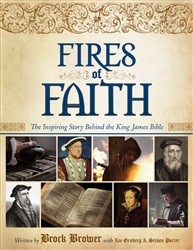Description
Brower, Brock; Groberg, Lee; Porter, Steven. American Fork, Utah: Covenant Communications, 2012, 115 pages.
Since its original publication in 1611, the King James Bible has had immeasurable influence on religion, language, culture, art, and literature—yet its road to influence and acceptance was paved with darkness. International politics, subversion, lust, and bloodshed set the stage for the heroic “heretics” who sought to translate the word of God into the English vernacular. Fires of Faith crisscrosses a tumultuous Europe at the birth of religious freedom and chronicles characters central to the Reformation, including John Wycliffe, Martin Luther, King Henry VIII , and “Bloody” Queen Mary I, culminating with the reign of King James I and his commissioned translation of the Bible. At the forefront of the saga is William Tyndale, the British religious scholar who directed the translation and ultimately became a martyr in the fires of faith. This intriguing three-part documentary series features more than 130 reenactments filmed in eight countries, with great care taken to represent the scenes visually and historically accurate. Commentary from 18 international scholars and religious leaders tells the story of one of the greatest committee efforts in history, resulted in the most influential and enduring book the Western world has ever seen.
Part 1—Yearning for the Word Discover the history of the English Reformation and learn about the varying roles Martin Luther, William Tyndale, and King Henry VIII had in its development.
Part 2—Martyrs for a Book
Gutenberg’s revolutionary printing press aided the Protestant Reformation and sped up the printing of illegal Bibles being smuggled into England. Within a year, many influential heretics” were betrayed, imprisoned, and martyred for their beliefs.
Part 3—The King James Bible
In 1604, England’s King James ordered a new translation of the Bible. After seven years, 54 scholars, and one of the greatest committee efforts in history, those who persevered brought forth the most widely used book ever written.
